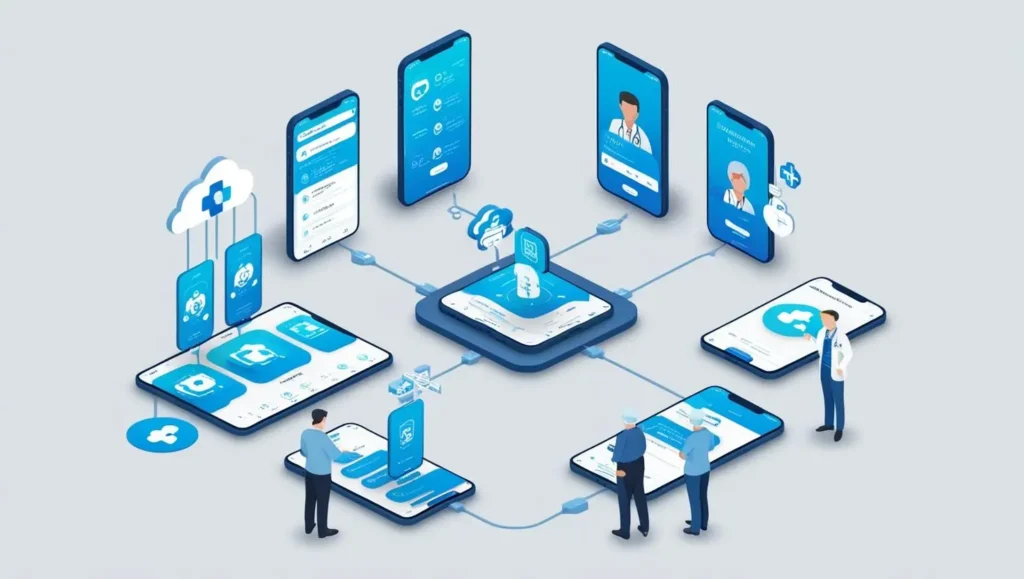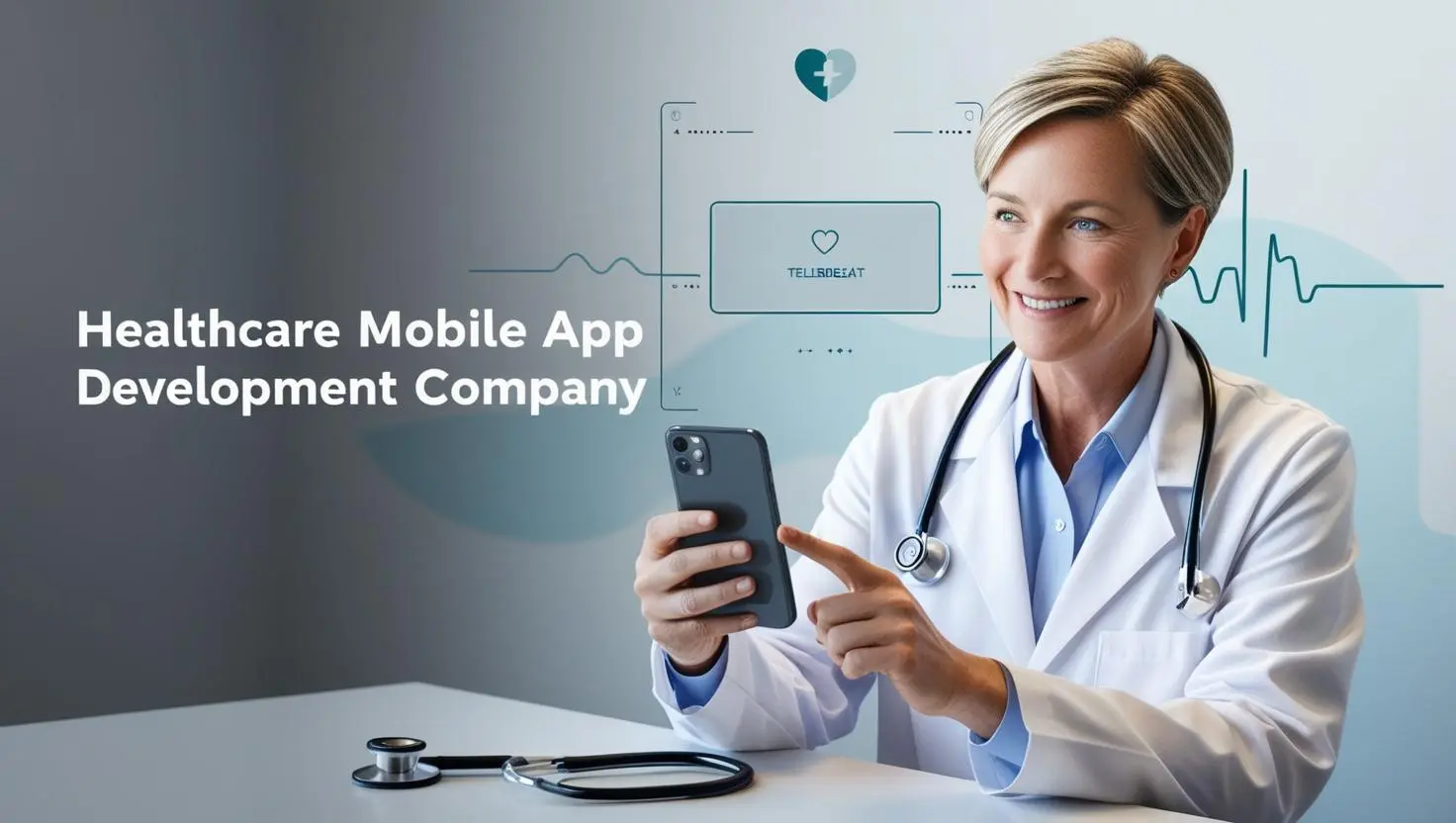The evolving role of mobile applications in communication and interaction between patients and providers is impacting the healthcare field as a whole. At the same time, the use of mobile apps for virtual consultations and remote patient monitoring is streamlining processes while improving patient involvement. This illustrates the immense potential that mobile applications possess for transforming care delivery. In order to take full advantage of this potential, working with a reliable mobile healthcare app development company is essential.
This article outlines the major services offered by an healthcare mobile app development company, the key features to consider, mobile healthcare use cases, and the technologies which are defining the future of the industry.
Why Work With A Dedicated Mobile Healthcare Applications Development Company?
In contrast to generic software vendors, a specialized software development company possesses unique knowledge of the field, understands the compliance and regulatory requirements, as well as having the ability to create user-friendly, medical-grade, secure, and scalable solutions. A partnership with a vendor who specializes in healthcare mobile applications ensures:
- HIPAA, HL7, and GDPR compliance
- Interoperability with EHR/EMR systems
- Security-first design with encryption, MFA, and secure APIs
- Patient-centered UX/UI
- Scalable cloud-based infrastructure
Such companies also understand clinical workflows, patient needs, and healthcare provider challenges—key factors that generic software firms often overlook.
Core Services Offered by Healthcare App Development Companies
A top-tier healthcare mobile app development company provides a full range of services, including:
1. Custom Healthcare App Development
Tailored mobile solutions for hospitals, clinics, insurers, and health-tech startups. This includes both native (iOS/Android) and cross-platform apps.
2. Telemedicine App Development
Creating HIPAA-compliant platforms that enable virtual consultations, secure messaging, video calls, e-prescriptions, and integrated billing systems.
3. Remote Patient Monitoring (RPM)
Integrating with wearables and IoT devices to track vitals, deliver alerts, and empower preventive care through real-time monitoring.
4. Appointment Booking & Scheduling Apps
Automating scheduling, calendar sync, cancellations, reminders, and follow-ups, reducing administrative workload.
5. Chronic Care Management Apps
Supporting long-term treatment plans for diabetes, hypertension, and asthma through tracking, education, and medication management.
6. Mental Health Apps
Offering guided therapy, mood tracking, anonymous support forums, and access to therapists
7. Healthcare CRM Systems
For private practices and clinics to manage patient engagement, marketing, and data analytics efficiently.
Top Use Cases for Healthcare Mobile App Development
1. Telemedicine Platforms for Rural Healthcare
Use Case: A healthcare system in a rural region needs to reduce patient travel and specialist wait times.
Solution: A telemedicine app development company builds a platform allowing real-time video consultations, diagnostics uploads, and prescriptions.
Result: Improved access to care, reduced operational costs, and enhanced patient satisfaction.
2. Chronic Disease Management for Diabetic Patients
Use Case: A diabetes clinic wants to improve patient adherence to medication and lifestyle changes.
Solution: A mobile app is developed with features like blood sugar tracking, medication reminders, diet plans, and AI-driven alerts.
Result: Better glycemic control, reduced readmission rates, and improved patient engagement.
3. Hospital Workflow Automation
Use Case: A large hospital wants to digitize manual processes and improve coordination across departments.
Solution: A healthcare app development company builds an app integrated with the hospital’s EHR and ERP systems.
Features: Real-time updates for doctors, shift assignments for nurses, digital prescriptions, and lab result access.
Result: Increased efficiency, reduced paperwork, and improved patient care continuity.
4. Mental Health App for College Students
Use Case: A university seeks to address rising anxiety and depression among students.
Solution: A mobile mental health platform offering meditation guides, CBT tools, and access to on-campus counselors.
Result: Increased access to mental health resources, reduced stigma, and measurable improvements in student well-being.
5. Wearable Integration for Elderly Care
Use Case: A senior living community wants to monitor residents’ health non-intrusively.
Solution: Integration of wearable devices with a centralized dashboard app that caregivers can access.
Features: Heart rate monitoring, fall detection alerts, medication compliance tracking.
Result: Better response times, reduced hospitalizations, and peace of mind for families.
Features to Include in a Healthcare App
A competent healthcare mobile app development company will include core features such as:
- Secure User Authentication (MFA/Biometric)
- Video Conferencing and Chat Modules
- In-app Payment & Insurance Verification
- Push Notifications & Reminders
- Symptom Checkers or AI Bots
- EHR/EMR Integration
- Analytics Dashboard for Providers
- Offline Functionality
Technology Stack in Healthcare Mobile App Development
Healthcare apps rely on modern technologies to deliver high-quality experiences:
- Frontend: React Native, Flutter, Swift, Kotlin
- Backend: Node.js, Django, Firebase, AWS, Azure
- Database: MongoDB, PostgreSQL, MySQL, Cloud Firestore
- APIs: FHIR, HL7, Stripe, Twilio, Zoom SDKs
- Security: OAuth 2.0, JWT, SSL encryption, biometric logins
AI, Machine Learning, and blockchain are increasingly being integrated to enhance personalization, diagnostics, and data security.

Compliance and Data Privacy
One of the most critical aspects of healthcare application development is compliance with:
- HIPAA (for the US market): Ensures patient data privacy.
- GDPR (for Europe): Regulates data use and consent.
- HL7 & FHIR: Standards for data interoperability.
- FDA Regulations: For apps classified as medical devices.
A trustworthy healthcare app development company will navigate these regulatory requirements from the design phase onward.
How to Choose the Right Healthcare App Development Partner
Here are the critical criteria to evaluate:
| Criteria | What to Look For |
| Experience | Years in healthcare tech, industry focus |
| Compliance Knowledge | HIPAA, HL7, GDPR expertise |
| Portfolio | Case studies in telehealth, RPM, and hospital apps |
| Tech Expertise | Cross-platform, API integrations, cloud deployment |
| Post-Launch Support | Maintenance, monitoring, and version updates |
| Communication | Agile process, clear timelines, project managers with medical tech experience |
Top Healthcare App Development Companies in 2025
While there are many vendors, a few stand out due to expertise and client satisfaction:
- ScienceSoft – Known for building full-scale telehealth ecosystems.
- Epicsoft Technologies – Combines design thinking with HIPAA-compliant builds.
- SolveIt – Offers flexible engagement models and strong post-launch support.
- Invotech – Emerging player with innovative mobile-first health solutions.
- Aloa – Strong emphasis on managed development with compliance oversight.
Final Thoughts
Investing in a compliant mobile application that is user-friendly and robust is critical in winning the future of healthcare. A healthcare mobile app development company can provide value through improved operational efficiency, empowered patients, enhanced care, and other areas.
A healthcare mobile app development company or a telemedicine app development company may be your best bet in executing your vision. Partnering with experts on compliance, clinical workflows, and even user experience makes these companies instrumental in the digital transformation journey.
Now is the right time to speak to a healthcare app development service to realize your next innovation in healthcare.
Frequently Asked Questions
Q: What is the cost of developing a healthcare mobile app?
A: Costs range from $30,000 to $250,000, depending on complexity, features, integrations, and compliance requirements.
Q: How long does it take to build a healthcare app?
A: Typically 3–9 months from ideation to deployment, with ongoing maintenance and updates afterward.
Q: Are healthcare apps required to be HIPAA compliant?
A: If the app handles protected health information (PHI) in the U.S., HIPAA compliance is mandatory.

